Feeding Consumers' Curiosity with Hands-On Learning
November 14, 2021
By Ann Thelen | Photos by Joclyn Bushman, Iowa Soybean Association
A group of food-minded Iowans recently went behind the scenes of the farm-to-table chain with the Iowa Food & Family Project as hosts rolled out the red carpet for experiential learning.
Consumers have increasing appetites for learning more about where their food comes from, how farmers integrate sustainable solutions on their farms, and what goes on behind the scenes in production and supply chain facilities. That’s where the Iowa Food & Family Project’s (Iowa FFP) consumer-centric Food U educational events come into play.
After a two-year hiatus of in-person food and agriculture tours, 20 Iowans participated in Iowa FFP’s Nov. 5 Food U event. From touring Story City Locker and Iowa State University (ISU) Creamery to a lunch and learn at the Iowa Beef Industry Council and final stop at Key Cooperative, the trip highlighted many facets of the supply chain.
“During Food U events, food-minded Iowans have access to hands-on learning opportunities across a variety of sectors in the farm-to-table chain,” says Lydia Zerby, consumer insights and engagement manager for the Iowa Soybean Association and Iowa FFP. “Our educational events feed consumers’ curiosity for understanding more about food and agriculture.”
STOP 1 — “Meating” for a Tour: Story City Locker
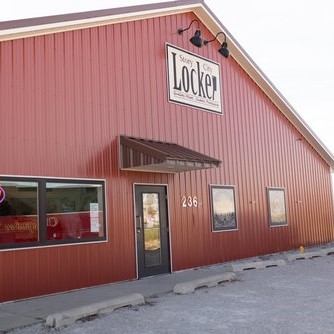
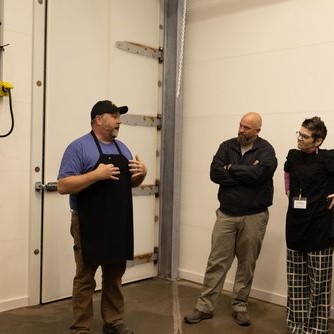
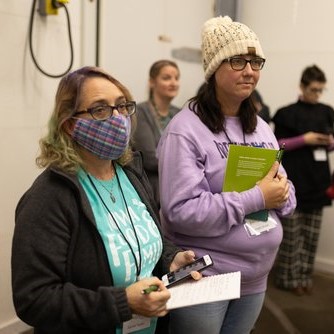
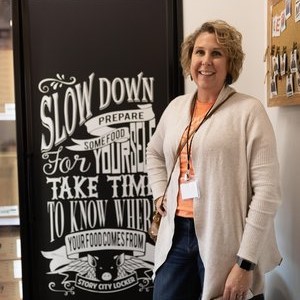
Ty and Bobbie Gustafson, owners of the Story City Locker, are committed to providing quality service and products to Central Iowa. They believe that sustainable farming practices and local food supply systems broadly improve quality of life.
“When we built the facility eight years ago and opened our business, we wanted to create a place where people could tour and learn about ethical animal treatment and sustainable butchery,” Ty explains. “We focus strictly on local meats; everything we sell comes from farmers that we know.”
Ty grew up in northwest Iowa, helping his dad farm and raise pigs. As an adult, Ty worked his way into corporate leadership, which he ultimately became discontent in and pursued business ownership. A hunter with a heart for rural life, Ty focuses the bulk of his energy on owning and operating Story City Locker.
“We craft products for our retail space from livestock that we harvest right here at Story City Locker (versus buying box meat),” Ty explains. “We prioritize harvest for our farmer-customers and customers processing for bulk home freezer storage. Then, we stock the retail space, offering some cuts for walk-in customers.”
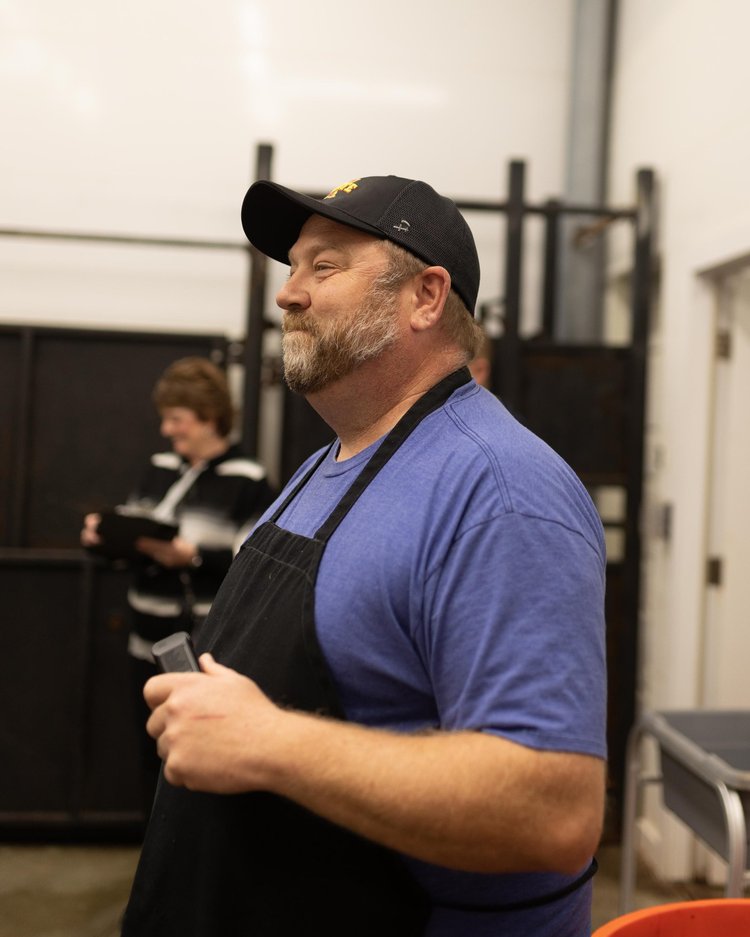 All the beef processed at Story City Locker is dry-aged in huge walk-in coolers for two weeks, enhancing quality and tenderness. Pork, lamb and goat are aged for one week. The facility harvests meat five days a week, and everything goes through official inspection to make sure all products meet strict U.S. Department of Agriculture (USDA) criteria. Beyond Ty, a team of eight full-time employees is rigorous in orderly processing practices. For example, all beef (which is a ruminant because the cow has multiple stomachs) is processed first, everything is cleaned, and then the team moves on to omnivores, such as pork. It’s a systematic process, ensuring consumers know they are getting the finest products.
All the beef processed at Story City Locker is dry-aged in huge walk-in coolers for two weeks, enhancing quality and tenderness. Pork, lamb and goat are aged for one week. The facility harvests meat five days a week, and everything goes through official inspection to make sure all products meet strict U.S. Department of Agriculture (USDA) criteria. Beyond Ty, a team of eight full-time employees is rigorous in orderly processing practices. For example, all beef (which is a ruminant because the cow has multiple stomachs) is processed first, everything is cleaned, and then the team moves on to omnivores, such as pork. It’s a systematic process, ensuring consumers know they are getting the finest products.
“At all stages of the process, we constantly monitor meat temperature, complete paperwork, meet standards for cleanliness and more,” Ty explains. “We are a USDA-certified facility and also work closely with ISU, the meat science area, food inspectors and other industry professionals. In addition, we’re organic-certified and AWA-certified (Animal Welfare Association).”
During the tour, Ty told how the Story City Locker follows Temple Grandin’s protocols for the humane treatment of the livestock coming to the facility. A well-known scientist and animal behaviorist, Grandin’s recommendations include making the environment calm and comfortable for the livestock, such as specific wall colors, floor standard and noise levels. Not only is this good for the animal, but it also results in higher meat quality.
“These procedures at the meat locker were good to hear because I did not know such things were practiced,” says Mary Schley, a Food U participant from Norwalk.
Angie Webb, a Food U participant from Waterloo, echoed those same sentiments. “The tour made me realize how passionate these people are and how they really are trying to do things humanely.”
STOPS 2 and 3 — Sweet Success: ISU Creamery and ISU Culinary Discovery Lab
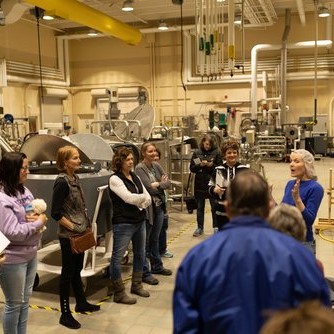
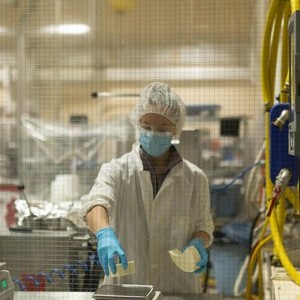
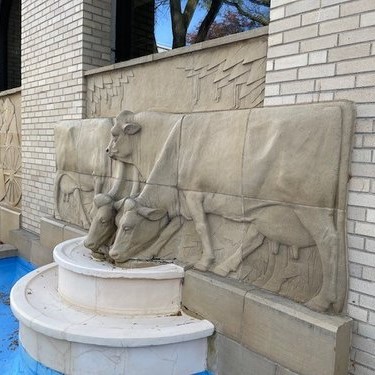
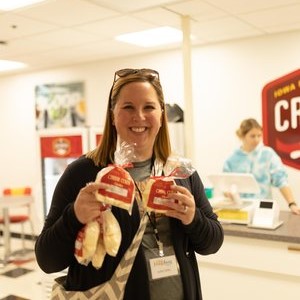
After a 50-year hiatus of the ISU Creamery, Professor Dr. Stephanie Clark re-established the creamery in 2020 within ISU’s Food Science & Human Nutrition department. In addition to offering hands-on training to students and short courses to entrepreneurs, the ISU Creamery makes ice cream from scratch. And, it produces cheese for sale in its retail shop, located in the former Dairy Industry Building. It’s in the same campus location where carriages brought farm-fresh milk in large cans to the creamery nearly 100 years ago.
The ISU Creamery is among the few university-based dairy food science programs that produce and sell dairy products. Its experiential learning fully prepares dairy food science students for the most-skilled positions in the fast-paced and competitive dairy processing industry.
“We teach students theory and also provide hands-on teaching because that’s the best way to learn. We blend historical and modern techniques,” Clark explains. “This way, they can make decisions on how to make ice cream or cheese properly. There’s science, but there’s also an art to making both products.”
Making ice cream is a sweet spot for the ISU Creamery, using local milk from Anderson Erickson Dairy. With flavors like Wintersgreen (named for ISU’s president), Campanile Kiss and Two Swans (named for ISU’s two resident swans Lancelot and Elaine), consumers flock to the second-floor store in the building to purchase the tasty treats. Cheddar cheese and cheese curds, made by the students, are also available.
Students learn about pasteurization, heating and cooling techniques to ensure safety, proper consistency and integrating ingredients during the ice cream-making process. With cheesemaking, artisan skills are taught to understand the benefits of using non-homogenized milk, reactions with enzymes, pulling out moisture, and cheddaring to make squeaky-fresh cheese curds. The cheddaring process involves taking the slabs of cheese (curd at this point) out of vats and repeatedly flipping and stacking them. Milk for the cheese is also sourced locally and comes from Picket Fence Creamery.
“Cheddaring stretches the curd and allows moisture to be extracted,” Clark explains. “The whey is continuing to drain out as the protein is stretched. The nice stretch that you get in fresh cheese curds is from the cheddaring process over a two-hour period.”
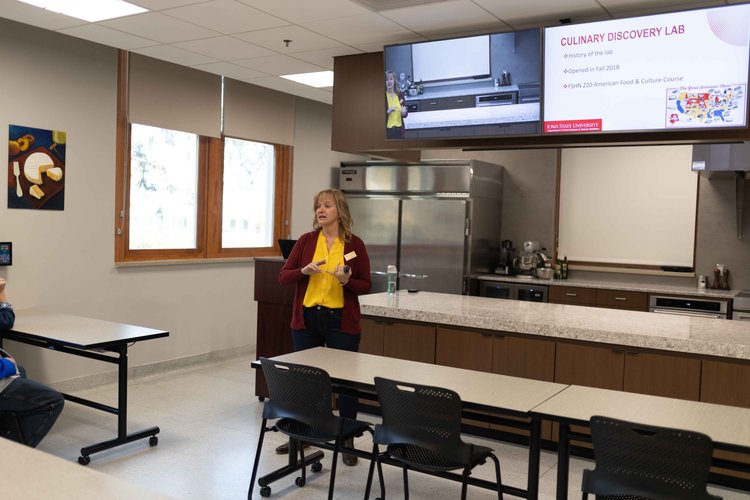 Within the same building, the Culinary Discovery Lab was opened in 2019, and before the renovation, the space was home to the food science microbiology laboratory.
Within the same building, the Culinary Discovery Lab was opened in 2019, and before the renovation, the space was home to the food science microbiology laboratory.
“Culinary food science is an interdisciplinary degree combining a strong food science foundation with basic culinary skills development,” explains Erica Beirman, teaching professor. “We don’t create chefs through this program, but we do create food scientists with creative training.”
When the new laboratory opened, new courses were created for this space; this includes the American Food & Culture course, where students learn about 10 regional cuisines in the U.S. The course includes Tasting Immersions for each region, where students taste several authentic dishes from the area during the sessions.
The Culinary Discovery Lab has camera and streaming capabilities making it useful for a variety of audiences. It has provided culinary workshops to elementary, middle and high school students and an ISU Alumni Association charcuterie and wine pairing workshop.
Recently, the Lab partnered with the Iowa Egg Council to provide a culinary workshop to more than 200 Waukee High School students and is replicating the workshop again this month. These workshops are hosted by the Culinary Food Science students and the Food Science & Human Nutrition faculty.
“The discovery lab for the culinary program is beautiful and practical,” says Diane McElroy, a Food U participant from Johnston. “It’s exciting to see new outreach programs happening for schools and the public with this new facility.
STOP 4 — Beefing up Knowledge: Iowa Beef Industry Council
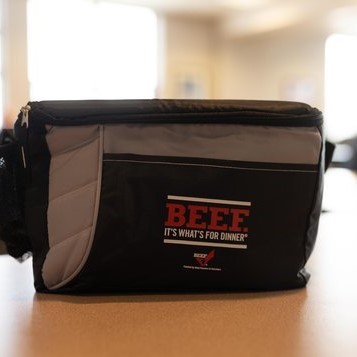

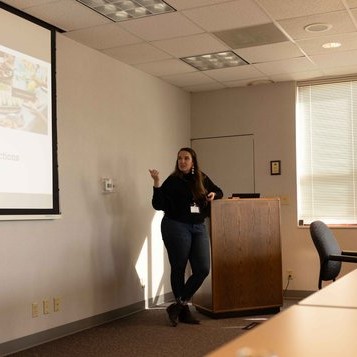
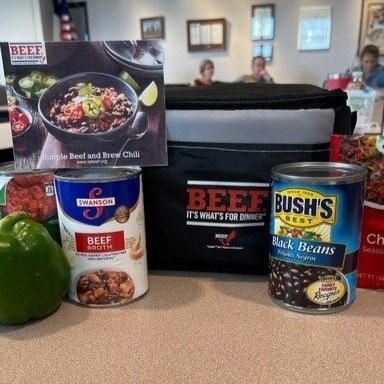
To continue feeding Food U participants’ hunger for knowledge, the group was treated to a lunch and learn at the Iowa Beef Industry Council (IBIC) in Ames. IBIC is dedicated to expanding consumer demand for beef, strengthening beef’s position in the global marketplace and improving producer profitability.
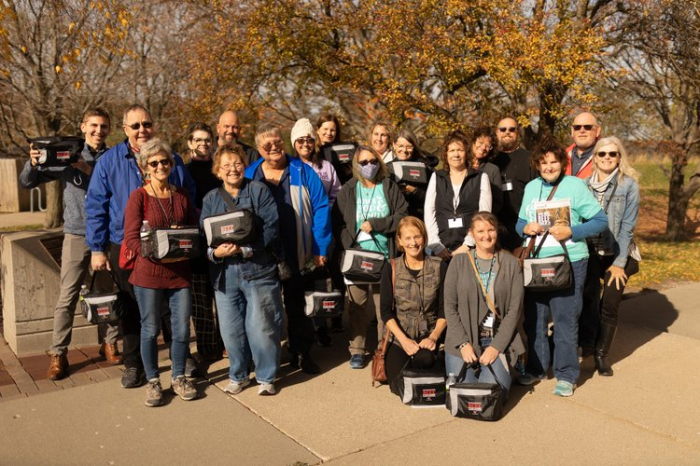
There are more than 25,000 cattle operations in Iowa, including more than 19,000 farms with beef cows. On Jan. 1, 2021, Iowa was home to 3.65 million cattle.
“Beef is an excellent source of protein with 25 grams in 3 ounces and just 173 calories, which is about the size of a deck of cards,” says Kylie Peterson, IBIC director of marketing and communications. “Plus, beef is filled with vital nutrients such as B vitamins and zinc. Zinc is essential for a healthy immune system, which is especially important heading into the cold weather season.”
There are so many beef choices, and we live in a country where beef is consistently graded, inspected and raised with care. Whether you purchase your beef from a grocery store or a local farm, IBIC wants consumers to have a great eating experience. They recently assembled a local beef directory to help connect consumers with options to purchase beef directly from farmers.
“Through this tour, you really see how farmers are such a huge part of the food production cycle,” says Leah Godbersen, a Food U participant from Arthur.
STOP 5 — Serving Producers: Key Cooperative
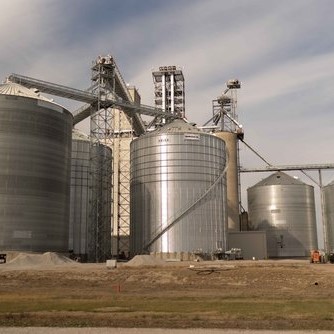
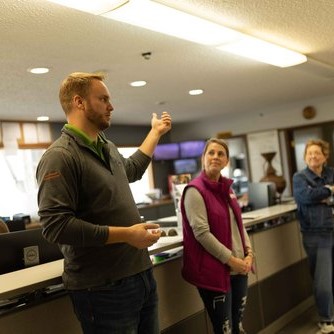
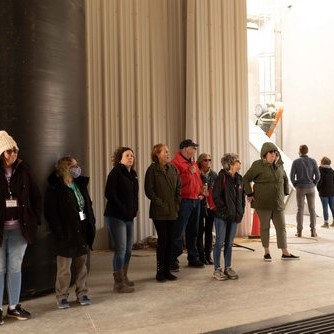

As a member-owned cooperative, Key Cooperative serves more than 1,800 farmers and 10,000 customers in 13 communities across the state of Iowa. Key Cooperative’s roots stretch back to 1918 when local farmers pooled their resources to purchase goods and services they needed to run their businesses and collectively market their grain. By the 1960s, agricultural co-ops were purchasing the specialized equipment required to handle and apply crop nutrients as well as new types of chemical crop protection coming to market.
Today, cooperatives continue to do all those things and have become centers for innovation and knowledge-sharing. As a co-op, profits are reinvested back into the cooperative or returned to their shareholders. Cooperatives are also focused on their communities. In a typical year, Key Cooperative invests about $100,000 in communities through scholarships, grants and donations while providing countless volunteer hours.
 “At Key Cooperative, we have four divisions – grain, agronomy, feed and energy,” explains Sara Clausen, director of communications and member relations. “We exist to support producers (farmers), who in turn support consumers through growing and raising crops and livestock for food.”
“At Key Cooperative, we have four divisions – grain, agronomy, feed and energy,” explains Sara Clausen, director of communications and member relations. “We exist to support producers (farmers), who in turn support consumers through growing and raising crops and livestock for food.”
Perry Ritland, Key Cooperative’s board president, adds, “Every producer wants to provide the best and safest food possible. That’s the ultimate priority.”
The Nevada location, which Food U participants toured, was rebuilt after the 2020 derecho, which damaged 40 bins at 10 of Key Cooperative’s central Iowa locations that receive grain. Of those damaged, 20 bins were destroyed, taking out about 6 million of Key Cooperative’s 30 million bushels of storage, or about 20%. In all, 12 million bushels of storage were affected by the storm, which had estimated wind gusts of up to 130 mph.
Kari Holloway, a Food U participant from Adel, has participated in several Iowa FFP-sponsored educational events over the years. She says, “On every trip, I learn how caring and passionate farmers are across Iowa.”
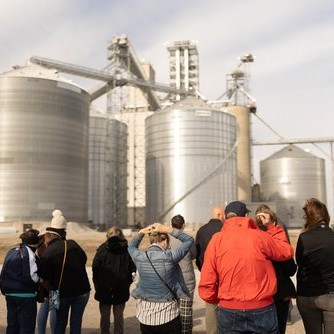
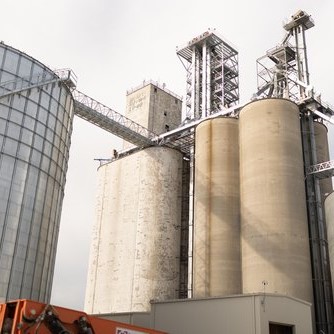
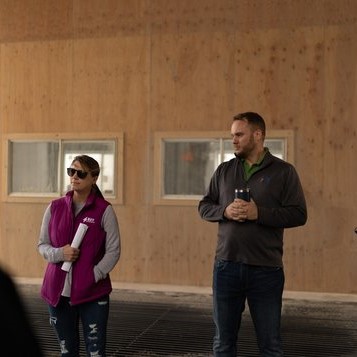
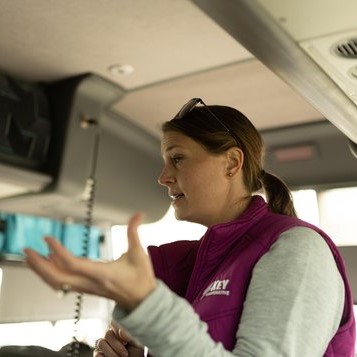
About Food U
Food U is an exclusive program for Iowa Food & Family Project (Iowa FFP) Champions. Throughout the year, Iowa FFP Champions – individuals who want to take a proactive role in learning more about all things food and farming – are invited to participate in special weekday learning activities. The activities include business and farm tours and meeting with individuals and groups who are involved in agriculture. All Iowa FFP Champions are volunteer participants. Learn more at www.iowafoodandfamily.com/about/food-u.